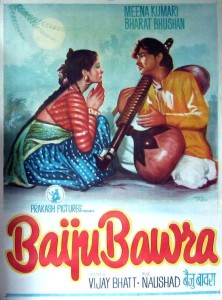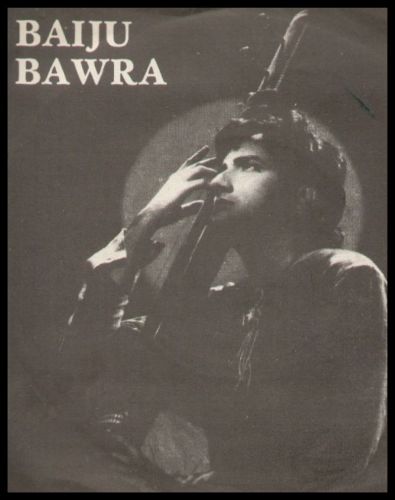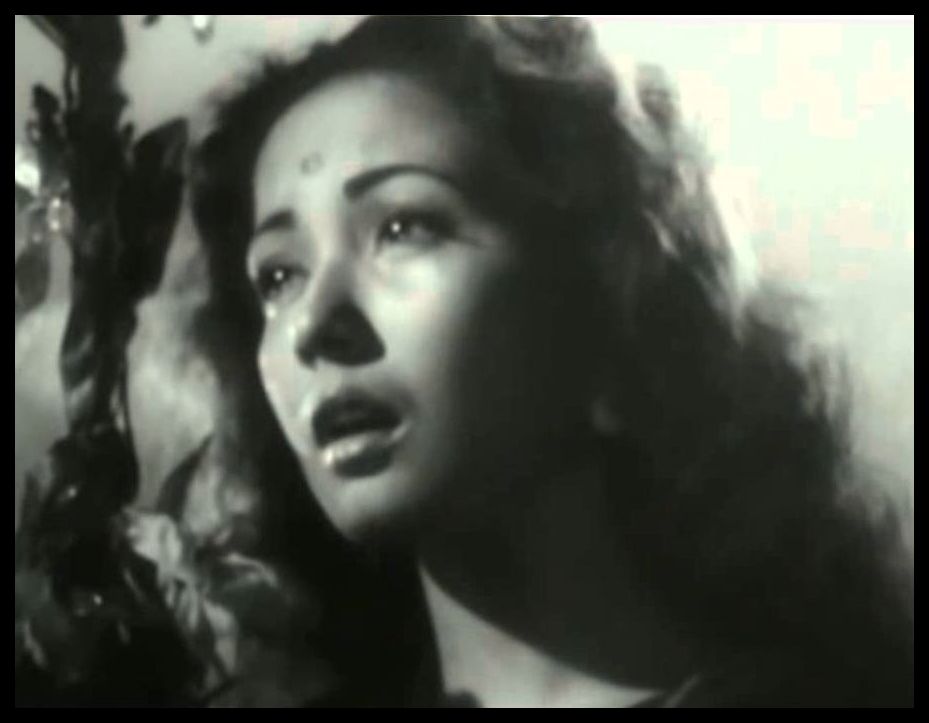Starring:
Bharat Bhushan (Baiju), Meena Kumari (Gauri), Surendra (Tansen),Kuldeep Kaur (Roopmati), Rattan Kumar (Young Baijnath) and Baby Tabassum(Young Gauri) along with Bipin Gupta,Manmohan Krishna,B M Vyas,Radha Krishan and others.
Director – Vijay Bhatt
Music – Naushad
Lyrics – Shakeen Badayuni
Cinematography – V N Reddy
Producers – Shankar Bhatt/Vijay Bhatt
“Around the popular figure gathers many a legend that obscures history, if any…..and what is history but legend agreed upon ?!”

- Baiju Bawra (1952)
These opening lines from Baiju Bawra leave it on the viewer’s discretion how they would like to acknowledge the story of Baiju. You can call it legend or maybe just history and you may or may not believe the anecdotes of Baiju lighting up lamps and calling the rain gods with his singing. The story of Baijnath may be more of a legend with little historical acceptance but Baiju is always remembered whenever the world talks about Tansen – the ‘Sahenshah-e-Mausiki’.
Synopsis
Vijay Bhatt’s Baiju Bawra begins with the view of Tansen’s palace. Crowds assemble outside the palace to hear ‘Sahenshah-e-Mausiki’ Tansen do his daily riyaaz (practice) ; some say he is composing new raags.Nobody is allowed to sing near the palace as it would disturb Tansen, however if anyone did sing then it would be taken as a challenge to Tansen , he would then have to compete with Tansen in a musical duel and the loser would get death.

Bharat Bhushan as Baiju
Here we are introduced to two different sets of people , one is Ghaseet Khan and his fans – Ghaseet Khan is the Tansen of the poor although he considers Tansen to be of no match to him. The second group is a group of travellers who sing kirtans (religious hymns) while they go around; little boy Baiu is part of this group.They are confronted by the palace guards and asked to stop singing , a scuffle breaks out and leads to the unfortunate death of Baiju’s father.Young Baiju holds Tansen responsible his father’s death vows to take revenge.
However destiny had other plans, Instead of reaching Haridas swamy in Vrindavan; Baiju meets Pandit ji who is impressed by his musical acumen and decides to take him to his own village. Here Pandit Ji gives Baiju an important lesson; he tells him “sangeet sagar ki satah par tairne wale bahut hain par doobne wale bahut kam”(there are many who swim in the ocean of music but there are few who drown in it).

Meena Kumari as Gauri
In the village Baiu meets little Gauri; the village boatman’s daughter and they become friends.Time passes ; Baiju and Gauri grow up. But Gauri’s love makes Baiju forget the real purpose of his life. He had set out to become a better musician than Tansen ; he has to challenge Tansen and take revenge of his fathers murder.
Moreover Gauri’s wedding is fixed with village lad Narpat. In order to impress Gauri; Narpat calls for Ghaseet Khan from Agra to teach him music. Ghaseet Khan however thinks it is Baiju who has called him to become his teacher. Misfortune strikes and the village is attacked by dacoit Roopmati ; however she spares the village by taking Baiju along with her. Roopmati’s story is similar to that of Baiju as her father had also been killed by the royal forces. Being away from Gauri ; Baiju now remembers the real purpose of his life and leaves Roopmati to go and kill Tansen. He manages to reach Tansen’s room with a sword in his hand but he is unable to kill as he is mesmerised by the notes sung by Tansen. He realises that his revenge cannot be accomplished by sword but only by music. His music needs to have the pain and the depth to beat Tansen ; so he finally reaches Vrindavan to be in the care of Haridas swami.
What make Baiju become Baiju Bawra(crazy) , does he defeat Tansen and does he get back Gauri?
You need to watch Baiju Bawra yourself to know all this as I will not spoil the plot for those who indeed plan to go ahead and watch the movie!!
Music
The film being the story of Baiju Bawra, the music had to touch the heart and soul of the viewers. As required; Naushad and Shakeel Badayuni produced some immortal compositions for the film. All the songs were based on Hindustani classical ragas and vocals were rendered by Mohammad Rafi, Lata Mangeshkar, Shamshad Begum, and renowned classical vocalists Amir Khan and D. V. Paluskar.
It is well known that “O Duniya Ke Rakhwale” (raag darbari ) and “Man Tarpat Hari Darshan Ko Aaj” (Raag Malkauns) immediately established Mohammed Rafi as the top playback singer in hindi films.
Another highlight of the film was the on screen musical duel between Baiju and Tansen to which the vocals were provided by renowned classical vocalists Amir Khan and D. V. Paluskar. Rafi having done the playback for Baiju in all other songs was not the choice for this song ; possibly because the onscreen requirement here would have been just too much for a playback singer. Towards the end of this song in the film , Baiju reaches very high notes so as to melt the small block of marble kept in the centre;so ace Hindustani classical vocalist Pandit Dattatreya Vishnu Paluskar (May 28, 1921 – October 25, 1955) was chosen to give the playback .Some other songs include “Tu Ganga Ki Mauj” (raag Bhairavi), “Mohe Bhool Gaye Sanwariya” (raag Bhairav) and the very melodious love song “Jhoole Mein Pawan Ki Aai Bahar”(raag pilu).
A couple of more songs that can’t be missed are the kirtan “Saancho tero naam raam” and the Mohammad Rafi solo “insaan bano”.
Awards
Meena Kumari won the best actress while Naushad won the best music director Filmfare award in 1953.
Conclusion
More than 60 years since Baiju Bawra was released, it remains one of Hindi cinema’s all time classics. It established Mohammad Rafi as the top playback singer and Naushad as the master of raag based Hindi film music. Meena Kumari bagged a Filmfare award and Bharat Bhushan also got good reviews. He went on to play many more historical characters in his career.
- More on Vijay Bhatt at http://www.vijaybhatt.net
- The Legend of Baiju Bawra (What Wikipedia tells about Baiju)
Baiju Bawra or Baijnath Prasad or Baijnath Mishra (1542–1613) was a dhrupad singerand the court musician of Raja Mansingh Tomar of Gwalher(modern Gwalior in Madhya Pradesh).Like Tansen, the musician at the court of Mughal Emperor Akbar, Bawra was a disciple of Swami Haridas (1512–1607).According to historical books preserved in Jai Vilas Mahal in Gwalior, he would light oil lamps by singing Raga Deepak, make it rain by singing the ragas Megh, Megh Malhar, or Gaud Malhar, and bloom flowers by singing raga Bahar as well as melting of stone by singing raga malkauns.Baiju died of typhoid at the age of 71 on the eve of the Indian festival, Basant Panchami in Vikram Samvat 1670 (1613 CE)in chanderi.
Vijay Bhatt’s Baiju Bawra (1952) seems to be a fictional account of the life of Baiju, however it was a successful film of the time.
